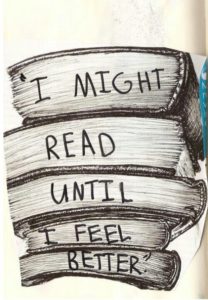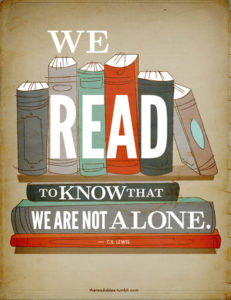These days we are besieged by alarming events, those unfolding in our own backyard and in the yards of far-flung places. We seek refuge from our angst of what is and what might be.
Mental escape is one popular way to cope with worries and as bibliophiles can attest, books are a magical escape route. But, can they provide more than that? Do books offer us a novel therapy during turbulent times—in both a literal and figurative sense?
If that seems like hyperbole, consider how well books can influence our perspective on the world or alter our mood; they can engender ideas, tap into emotions, and motivate behaviors—results we often seek from traditional treatments and remedies.
An eloquent case for the therapeutic value of literature is found on “What is Literature For?” a video describing how stories help us feel more connected, view our failures with less self-recrimination, and enhance our perspective and empathy for ourselves and others.
A formal use of bibliotherapy, incorporating books in counseling or psychotherapy, dates to the 1800’s. Mental health pioneer Dr. Benjamin Rush recommended that patients have access to a hospital library filled with books offering entertainment and knowledge. There was some concern at the time that reading cheap, “trashy” novels contributed to insanity, but Rush saw reading as an adjunct to therapy and recommended novels as a possible cure for melancholy (depression).
Soldiers returning from World War I and II were prescribed select books to help them process the trauma of war. Today, some psychotherapists still use bibliotherapy as an adjunct in their counseling.
But reading’s therapeutic value isn’t restricted to the clinical setting. The School of Life, a London-based philosophy book store, “devoted to developing emotional intelligence,” offers a web questionnaire and consultation in which bibliotherapists then match readers with works of literature.
 Reading can also indirectly help allay anxieties. In his recently published book, “Why? What Makes Us Curious” astrophysicist Mario Livio described the paradox that the more we know about a subject, the greater our desire to know more about it. Livio described how curiosity is one of the best remedies for fear, writing, “Through curiosity…even fear itself becomes just another natural phenomenon to be thoroughly investigated.” As a source of information and enlightenment, books are among the best catalysts for curiosity.
Reading can also indirectly help allay anxieties. In his recently published book, “Why? What Makes Us Curious” astrophysicist Mario Livio described the paradox that the more we know about a subject, the greater our desire to know more about it. Livio described how curiosity is one of the best remedies for fear, writing, “Through curiosity…even fear itself becomes just another natural phenomenon to be thoroughly investigated.” As a source of information and enlightenment, books are among the best catalysts for curiosity.
Like with other remedies, the half-life of books varies: some entertain us and some sustain us. Regardless of which, there seems to be residual value from having read.
During his decades of imprisonment and dark hours on Robben Island, former South African President Nelson Mandela found comfort and empowerment from the poem Invictus, with its message, “I am the master of my fate: I am the captain of my soul.”
In her memoir “I Know Why a Caged Bird Sings,” poet Maya Angelou described her awakening when she discovered the poetry and power within literature:
The essence escapes but its aura remains. To be allowed, no, invited, into the private lives of strangers, and to share their joys and fears, was a chance to exchange the Southern bitter wormwood for a cup of mead with Beowulf or a hot cup of tea and milk with Oliver Twist. When I said aloud, ‘It is a far, far better thing that I do, than I have ever done . . .’ tears of love filled my eyes at my selflessness.
In this blog’s premiere post, I wrote how books helped Terry Waite endure his long-term hostage Lebanon in the 1980’s. Waite, then the Church of England envoy, was held in solitary confinement for four years. He later wrote of how he found solace through his memory of books:
Apart from the obvious — family, friends and freedom ― I missed books….I was forced to depend upon memory and travelled back across the years to recall books I had read during my life. I made a list in my mind of those I had read during my childhood…I even dreamt about books
Despite John Donne’s protest that “no man is an island,” we all have times of fear and despair when we feel like an island, emotionally stranded, the only person going through our trials. Ironically, despite our perpetual electronic bonds, feeling disconnected from other people is a modern-day malady, and especially an emotional liability during times of turmoil.
Pulitzer-Prize winner Hisham Matar wrote in a New York Times Op Ed, “Books can’t install unknown feelings or passions into us. What they can do is develop our emotional, psychological and intellectual life, and, by doing so, show us how and to what extent we are connected.”
What is that if not healing?